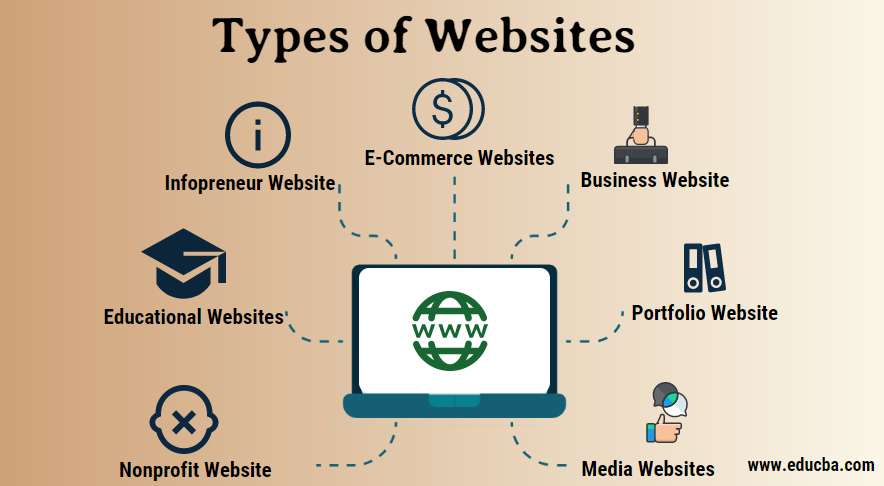
Introduction to Types of Websites
As of now, billions of websites are available for internet browsing, all of which compete for a share of the attention individuals offer each and every day. There were once text-only websites used for data purposes exclusively by government agencies and public organizations. Approximately 1.25 billion. This isn’t the number of planets or grains of sand on a beach in the galaxy. It is the current number of websites, and this amount is growing at an alarming rate. Amazon makes £ 62.500 for internet sales, while e-mail users send 204 million posts and bloggers publish 1,400 blog posts a minute. In this topic, we are going to learn about Types of Websites.
Types of Websites
Now we will be going to learn about the types of websites given below.
1) E-Commerce Websites
- A website for e-commerce is a website from which individuals can purchase products directly. You’ve likely previously used a number of e-commerce sites; most large brands and many smaller ones have one. Any website with a shopping cart, including a manner to provide data about credit cards for purchases, falls under this category.
- This website is the kind you must create if you are building a website for your enterprises and intend to sell your goods through the website. Some measures must be taken to guarantee that your clients are safe to pay for their eCommerce site, such as investing in eCommerce software and receiving your SSL certificate. Ecommerce websites can be an expansion of a company or something around which you are building a fresh company, therefore its important for to create your ecommerce website the right way.
2) Business Websites
- A website for a company is a website dedicated to a particular company. They should be branded as the company and communicate the goods and/or services that the company provides. Every prospective client you meet will simply suppose that they will find a website if they are looking for your company at Google. And it makes the company less professional or legitimate if they don’t.
- The website for e-commerce is business websites, but it is also possible to have company websites that do not directly sell anything but rather encourage visitors to contact us for further information or to go to a store if they are looking for customers.
3) Portfolio Websites
- Websites on portfolios are sites that show examples of previous work. A website can be used by service suppliers wishing to demonstrate to prospective customers the quality of their work to obtain some of the finest examples of previous work.
- This sort of website is easier to create than a company website and focuses more on a specific job: gathering job samples. This website has been most commonly employed by creative experts and freelancers based on proven expertise and can be a more effective solution to a business-like website.
4) Media Websites
- News stories or other reporting are collected on media websites. Some overlap here with entertainment websites, although media websites may include reported material concerning or only for entertainment purposes. Sites such as The Washington Post, Slate, and Inc. are included in this category.
- Media websites usually create cash by way of advertising, subscription models, or a mixture of both. There are many media sites online that are often the media branch of media properties, such as TV stations or newspapers, but some are only online. But there are also media properties.
5) Nonprofit Website
- Just as companies need websites to be online, so do non-profit companies. Many prospective donors can create donations by using a non-profit web page, and many individuals want to know more about a non-profit and see if they want to assist it.
- In order to show your legitimacy and reach more persons, constructing your company web site is or is considering starting a non-profit. You can use it to promote your organization’s initiatives, encourage supporters to take action and accept donations.
6) Educational Websites
- In the category of academic websites, websites of academic organizations and those provide online courses to students and the person who wants to study. The main aim of these websites is to provide visitors with educational materials or to provide them with information on a learning institution.
- Some instructional websites have publicity, such as entertainment and media websites. Some offer models of subscription or purchasing education products. And for a current organization, some serve as the internet presence.
7) Infopreneur Website
- Websites from Infopreneur overlap slightly with websites from businesses and e-commerce but are a single form of online business. Creating and selling data products by infopreneurs. This can be classes, tutorials, videos or ebooks. Infopreneurs need to work hard to build an awareness brand to convince tourists that they understand enough to create their instructional goods worth purchasing and to sell those goods.
- In order to safely sell data goods, some of the same website tools, including an SSL certificate and a commercial account, are required. For those with a wide variety of information products, e-commerce software should also make it simpler to pick and buy those who are concerned. An infopreneur website is a key place for both the free content that is a marketing tool to get individuals on the site and paid products that consider their earnings.
Recommended Articles
This is a guide to Types of Websites. Here we discuss the introduction of websites that will help your common knowledge and explain different types of websites. You may also have a look at the following articles to learn more –

